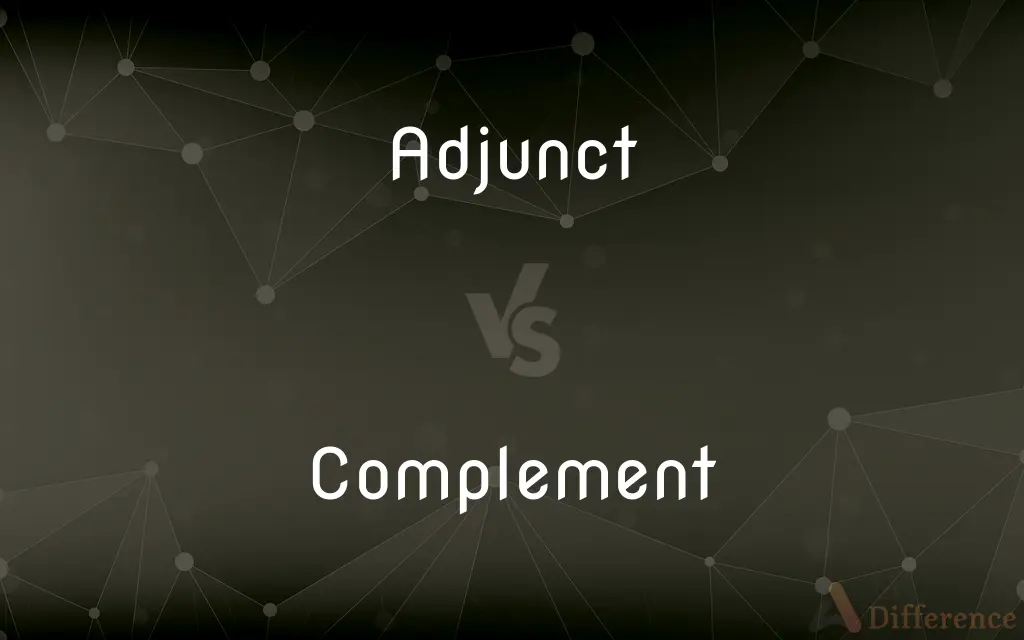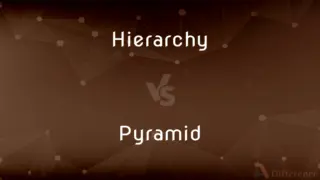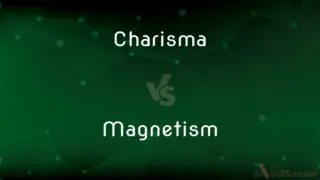Adjunct vs. Complement — What's the Difference?
Edited by Tayyaba Rehman — By Fiza Rafique — Published on October 24, 2023
Adjuncts are optional words or phrases that add extra information to a sentence, while Complements are necessary to complete the meaning of a verb or preposition in a sentence.

Difference Between Adjunct and Complement
Table of Contents
ADVERTISEMENT
Key Differences
In the realm of grammar, understanding the roles different components play in constructing meaning is vital. Adjuncts and Complements serve different functions in sentences.
An Adjunct, for instance, offers additional information. Think of it as an "extra" – it adds flavor to a sentence, but if you remove it, the core meaning remains. For instance, in "I ate quickly," "quickly" is an Adjunct, modifying how "I ate." On the other hand, Complements are crucial components of sentences. They provide necessary information that a verb or preposition requires to convey complete meaning. In "She is a teacher," "a teacher" is the Complement, providing essential information about "She." It's evident that while Adjuncts are more about embellishing, Complements are all about completing.
Comparison Chart
Function
Adds extra information.
Completes the meaning of a verb or preposition.
Necessity
Optional in a sentence.
Necessary to provide complete meaning.
Example
"She read the book in her room." (in her room is an Adjunct)
"She is a teacher." (a teacher is a Complement)
ADVERTISEMENT
Relation
Relates to verbs, giving more context.
Directly related to a verb or preposition to complete its meaning.
Removal Impact
Removal doesn't affect the core meaning of the sentence.
Removal makes the sentence grammatically incomplete.
Compare with Definitions
Adjunct
Offers context or clarification about an action.
She reads in the park.
Complement
Provides necessary information to complete the meaning of a verb.
She became a doctor.
Adjunct
Can be adverbs, prepositional phrases, or absolute phrases.
Dinner prepared, we started the movie.
Complement
Fulfills the requirement of certain verbs or prepositions.
He seems happy.
Adjunct
Provides details not essential to the main clause's core meaning.
The cat, covered in mud, walked in.
Complement
Without it, the sentence feels incomplete.
She is my best friend.
Adjunct
Enhances the description or circumstance of a verb.
They play soccer on weekends.
Complement
Something that completes, makes up a whole, or brings to perfection
A sauce that is a fine complement to fish.
Adjunct
Something attached to another in a dependent or subordinate position.
Complement
The quantity or number needed to make up a whole
Shelves with a full complement of books.
Adjunct
A person associated with another in a subordinate or auxiliary capacity.
Complement
The full crew of personnel required to run a ship.
Adjunct
(Grammar) A clause or phrase added to a sentence that, while not essential to the sentence's structure, amplifies its meaning, such as for several hours in We waited for several hours.
Complement
Either of two parts that complete the whole or mutually complete each other.
Adjunct
(Logic) A nonessential attribute of a thing.
Complement
An angle related to another so that the sum of their measures is 90°.
Adjunct
Added or connected in a subordinate or auxiliary capacity
An adjunct clause.
Complement
(Grammar) A word or words used to complete a predicate construction, especially the object or indirect object of a verb, for example, the phrase to eat ice cream in We like to eat ice cream.
Adjunct
Attached to a faculty or staff in a temporary or auxiliary capacity
An adjunct professor of history.
Complement
(Music) An interval that completes an octave when added to a given interval.
Adjunct
An appendage; something attached to something else in a subordinate capacity.
Complement
(Immunology) A complex system of proteins found in blood plasma that are sequentially activated and play various roles in the immune response, including lysing bacterial cell membranes, making pathogens more susceptible to phagocytes, and recruiting inflammatory cells to sites of infection or injury. Also called alexin.
Adjunct
A person associated with another, usually in a subordinate position; a colleague.
Complement
Mathematics & Logic For a universal set, the set of all elements in the set that are not in a specified subset.
Adjunct
(brewing) An unmalted grain or grain product that supplements the main mash ingredient.
Complement
A complementary color.
Adjunct
A quality or property of the body or mind, whether natural or acquired, such as colour in the body or judgement in the mind.
Complement
To serve as a complement to
Roses in a silver bowl complement the handsome cherry table.
Adjunct
(music) A key or scale closely related to another as principal; a relative or attendant key.
Complement
Something (or someone) that completes; the consummation.
Adjunct
(grammar) A dispensable phrase in a clause or sentence that modifies its meaning.
Noun adjunct
Complement
(obsolete) The act of completing something, or the fact of being complete; completion, completeness, fulfilment.
Adjunct
A constituent which is both the daughter and the sister of an X-bar.
Complement
The totality, the full amount or number which completes something.
Adjunct
(rhetoric) Symploce.
Complement
(obsolete) Something which completes one's equipment, dress etc.; an accessory.
Adjunct
(category theory) One of a pair of morphisms which relate to each other through a pair of adjoint functors.
Complement
(nautical) The whole working force of a vessel.
Adjunct
Connected in a subordinate function.
Complement
(heraldry) Fullness (of the moon).
Adjunct
Added to a faculty or staff in a secondary position.
Complement
An angle which, together with a given angle, makes a right angle.
Adjunct
Conjoined; attending; consequent.
Though that my death were adjunct to my act.
Complement
Something which completes, something which combines with something else to make up a complete whole; loosely, something perceived to be a harmonious or desirable partner or addition.
Adjunct
Something joined or added to another thing, but not essentially a part of it.
Learning is but an adjunct to our self.
Complement
A word or group of words that completes a grammatical construction in the predicate and that describes or is identified with the subject or object.
Adjunct
A person joined to another in some duty or service; a colleague; an associate.
Complement
(music) An interval which, together with the given interval, makes an octave.
Adjunct
A word or words added to quality or amplify the force of other words; as, the History of the American Revolution, where the words in italics are the adjunct or adjuncts of "History."
Complement
(optics) The color which, when mixed with the given color, gives black (for mixing pigments) or white (for mixing light).
The complement of blue is orange.
Adjunct
A quality or property of the body or the mind, whether natural or acquired; as, color, in the body, judgment in the mind.
Complement
(set theory) Given two sets, the set containing one set's elements that are not members of the other set (whether a relative complement or an absolute complement).
The complement of the odd numbers is the even numbers, relative to the natural numbers.
Adjunct
Something added to another thing but not an essential part of it
Complement
(immunology) One of several blood proteins that work with antibodies during an immune response.
Adjunct
A person who is an assistant or subordinate to another
Complement
(logic) An expression related to some other expression such that it is true under the same conditions that make other false, and vice versa.
Adjunct
A construction that is part of a sentence but not essential to its meaning and can be omitted without making the sentence ungrammatical
Complement
(electronics) A voltage level with the opposite logical sense to the given one.
Adjunct
Relating to something that is added but is not essential;
An ancillary pump
An adjuvant discipline to forms of mysticism
The mind and emotions are auxilliary to each other
Complement
(computing) A bit with the opposite value to the given one; the logical complement of a number.
Adjunct
Of or relating to a person who is subordinate to another
Complement
The diminished radix complement of a number; the nines' complement of a decimal number; the ones' complement of a binary number.
The complement of is .
Adjunct
An optional part of the sentence providing extra information.
He sings beautifully.
Complement
The radix complement of a number; the two's complement of a binary number.
The complement of is .
Complement
The numeric complement of a number.
The complement of −123 is 123.
Complement
(genetics) A nucleotide sequence in which each base is replaced by the complementary base of the given sequence: adenine (A) by thymine (T) or uracil (U), cytosine (C) by guanine (G), and vice versa.
A DNA molecule is formed from two strands, each of which is the complement of the other.
Complement
Obsolete spelling or misspelling of compliment. should this be at a different ety?
Complement
(biochemistry) alexin
Complement
(economics) complementary good
Complement
To complete, to bring to perfection, to make whole.
We believe your addition will complement the team.
Complement
To provide what the partner lacks and lack what the partner provides, thus forming part of a whole.
The flavors of the pepper and garlic complement each other, giving a very rich taste in combination.
I believe our talents really complement each other.
Complement
To change a voltage, number, color, etc. to its complement.
Complement
(obsolete) Old form of compliment
Complement
That which fills up or completes; the quantity or number required to fill a thing or make it complete.
Complement
That which is required to supply a deficiency, or to complete a symmetrical whole.
History is the complement of poetry.
Complement
Full quantity, number, or amount; a complete set; completeness.
To exceed his complement and number appointed him which was one hundred and twenty persons.
Complement
A second quantity added to a given quantity to make it equal to a third given quantity.
Complement
Something added for ornamentation; an accessory.
Without vain art or curious complements.
Complement
The whole working force of a vessel.
Complement
The interval wanting to complete the octave; - the fourth is the complement of the fifth, the sixth of the third.
Complement
A compliment.
Complement
To supply a lack; to supplement.
Complement
To compliment.
Complement
A word or phrase used to complete a grammatical construction
Complement
A complete number or quantity;
A full complement
Complement
Number needed to make up whole force;
A full complement of workers
Complement
Something added to complete or make perfect;
A fine wine is a perfect complement to the dinner
Complement
One of a series of enzymes in the blood serum that are part of the immune response
Complement
Either of two parts that mutually complete each other
Complement
Make complete or perfect; supply what is wanting or form the complement to;
I need some pepper to complement the sweet touch in the soup
Complement
Can be noun phrases, adjective phrases, or clauses.
I find it strange that he doesn't like chocolate.
Complement
Often follows linking verbs to describe or identify the subject.
The sky turned dark.
Common Curiosities
Can an Adjunct be at the beginning of a sentence?
Yes, for example: "In the morning, I jog."
Are all adverbs Adjuncts?
While many adverbs act as Adjuncts, not all of them do.
Is a Complement always required in a sentence?
No, only certain verbs or prepositions need a Complement for completeness.
What's the role of a subject Complement?
It follows a linking verb and provides information about the subject.
Which verbs often require Complements?
Linking verbs like "is," "became," and "seems" often need Complements.
Can prepositional phrases act as Adjuncts?
Yes, they often provide context, like "During the movie, he slept."
Can a sentence exist without an Adjunct?
Yes, Adjuncts are optional and provide extra information.
What happens if a necessary Complement is removed?
The sentence becomes grammatically incomplete.
Is "very" in "She is very tall" an Adjunct?
No, "very" is a modifier but not an Adjunct.
If I remove all Adjuncts, will the sentence still make sense?
Yes, the core meaning will remain, but details will be lost.
Can a sentence have multiple Adjuncts?
Yes, e.g., "He read the book in the library with his glasses."
Do Complements only relate to subjects?
Mostly, but they can also relate to objects, as in "I gave her a gift."
What's an object Complement?
It gives more information about the object, like "I consider him a friend."
Are all Complements noun phrases?
No, they can also be adjective phrases or clauses.
Can an Adjunct become a Complement in another context?
Not typically; their functions are distinct in terms of necessity and information provision.
Share Your Discovery

Previous Comparison
Hierarchy vs. Pyramid
Next Comparison
Charisma vs. MagnetismAuthor Spotlight
Written by
Fiza RafiqueFiza Rafique is a skilled content writer at AskDifference.com, where she meticulously refines and enhances written pieces. Drawing from her vast editorial expertise, Fiza ensures clarity, accuracy, and precision in every article. Passionate about language, she continually seeks to elevate the quality of content for readers worldwide.
Edited by
Tayyaba RehmanTayyaba Rehman is a distinguished writer, currently serving as a primary contributor to askdifference.com. As a researcher in semantics and etymology, Tayyaba's passion for the complexity of languages and their distinctions has found a perfect home on the platform. Tayyaba delves into the intricacies of language, distinguishing between commonly confused words and phrases, thereby providing clarity for readers worldwide.














































